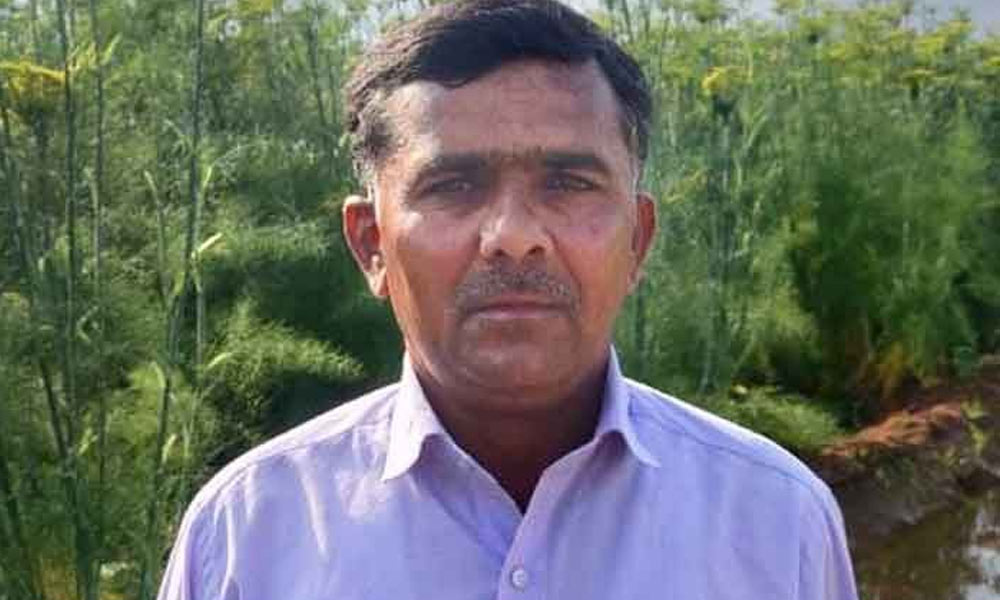This Raj farmer makes a mark through crop engineering

This Raj farmer makes a mark through crop engineering
Regarded as the 'Saunf King' of Sirohi, Ishaq Ali, a farmer 'scientist' in Rajasthan, has earned many laurels for innovating in the field of fennel farming and has left one and all surprised by producing over 25 tonnes on 15 acres of land, thereby making a decent earning of around Rs 30 lakh annually
Regarded as the 'Saunf King' of Sirohi, Ishaq Ali, a farmer 'scientist' in Rajasthan, has earned many laurels for innovating in the field of fennel farming and has left one and all surprised by producing over 25 tonnes on 15 acres of land, thereby making a decent earning of around Rs 30 lakh annually.
In fact, he launched a new variety of fennel called 'Abu Fennel 440' while bringing up techniques of water conservation.
It took him around 15 years to develop this variety that has produced an almost double yield (30 quintals per hectare), with better and distinct scent and shine and requires 55 per cent less water. Further, it is also resistant to most diseases that afflict the crop.
Ishaq Ali hails from an agricultural family and was keen to work in fields with his father and grandfather after completing his class 12 examination. "I wanted to try something different when my family was involved in the cultivation of commercial crops like cotton, mustard, and wheat," he said.
It was in 2005 when Ishaq embarked upon the cultivation of fennel with newer techniques.
He says, "Around 50 years back, a few farmers in the Sirohi district of Rajasthan grew fennel in very small quantities. However, they had to go back to traditional crops after failing in their initiatives. This was because they used the technique of direct sowing and lacked information on any value addition to the production and distribution of fennel. I knew that fennel is a crop that had great demand in the export markets and I wanted to work towards tapping into that."
"He spent time researching practices like changing the seed quality and paid attention to sowing and irrigation. The new technology checked the pest problem which increased the per acre production of fennel," he said.
Also, in traditional method of fennel cultivation, the gap between the beds ranged from 2 to 3 feet. However, we started following a gap of almost 7 feet between every bed which almost doubled the yield," he said with pride.
Although he was ridiculed for trying these new techniques, it was only when he started seeing better yields that people around him took note.
In 2007, we gave up on traditional farming and started working on fennel cultivation in our fields; presently, there are around 50 people who work on the fields every day.
"We knew the seed is the most important tool while farming and, hence picked the good ones out," looking at their probability of being high-yielding seeds.
Moreover, Ishaq also set up a fennel nursery to experiment with various kinds of the crops.
At that time, water concerns were there but techniques like drip irrigation and water sprinklers were not there and, hence we had to look for other techniques of water conservation. In an attempt to conserve water, the gap between each bed was further increased which further reduced pest infestation to a large extent.
At that time we were learning by trial and error. Soon we realised that fennel requires irrigation during the first sowing period, then at an interval of eight days and then on the 33rd day. This needs to be followed by irrigation at an interval of 12 to 15 days.
Ishaq says that even the agricultural research centres give a yield of about 22 quintals per hectare whereas the seeds being used by him give a yield of almost 33 quintals per hectare. "The seeds we use have greater immunity to fight pests," he said.
Further he changed the earlier set tradition of sun-drying the fennel and created a dry-shade area where the fennel is now dried. "We created this structure using bamboo and grass and ensured that the area got just enough sunlight," he said. This process helped retain its green colour and protected it from unnecessary moisture creeping in as well. While investing Rs 7 lakh each year, Ishaq was able to make close to Rs 30 lakh turnover each year and sold around 23 tonnes of fennel annually.
His children aim at expanding the business and take the produce directly to customers, he says.

















